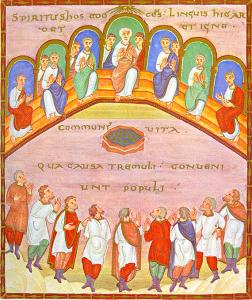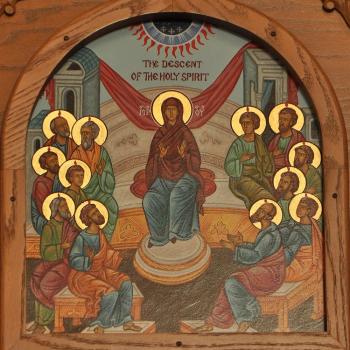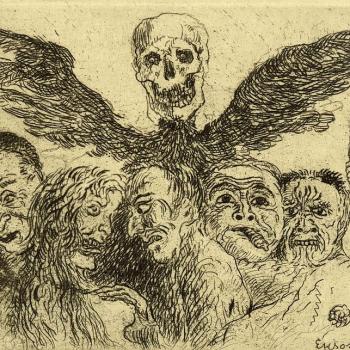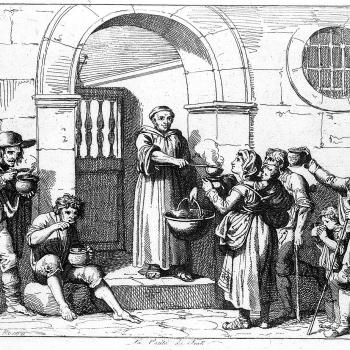
It is customary to talk about the history of humanity as if there were only one fall from grace, that is, the fall of Adam. While that fall, whatever it was, is significant, Scripture suggests that there were several different instances in human history in which there were other falls from grace, each time leading humanity into a worse position than it was before. Sadly, many try to take these stories as literal history, and in doing so, misunderstand them; these stories do represent aspects of history, but they are aspects which were turned into myth to make theological points. Since they have been rendered into myths, they are to be engaged as myths. Among these myths we have the fall of Adam and humanity’s expulsion from paradise, the story of Noah and the flood, and the story of the Tower of Babel telling us how human pride led to the dissolution of human unity (because humanity thought it storm the heavens and replace God with themselves).
Thus, we should not read these stories as literal, positive history, but as theological reflections about history. They point out that humanity has its own goodness given to it at its foundation, but sadly, humanity did not allow that goodness to thrive and grow, but rather, they used and abused it in various ways, and each time they did, they led to the establishment of more and more suffering in the world. While God intended humanity to participate in and experience the divine life, humanity had to be open to it; instead, humanity became self-focused, thinking it could establish itself as an equal to God, and in doing so, closed itself to the actual divine reality and the graces it gives. And the pride that led it to think it could become like God by itself became diffused throughout humanity as a whole, so that the unity which humanity was supposed to have with itself was lost, and human people turned on each other, each trying to assume more for themselves at the expense of others.
There can be, and probably are, historical events which served as the basis for these theological myths, but we must not confuse the way they were expressed in the myth as always reflecting the actual historical events. For example, it is likely that Noah’s story is based upon some flood, or groups of floods, which left a great deal of destruction in their wake, floods which, in part, were not properly dealt with because humanity did not embrace the way of love and so was unwilling to work together to save each other. While it could be and is interesting to reconstruct possible scenarios which led to the development of the myths found in Scripture, doing so can and will have us sidetracked from learning what those myths are trying to tell us and the kinds of warnings they give. Humanity can be seen as great; indeed, it should be great, but when it becomes so self-focused on that greatness, it can be and will be tempted to abuse it, and in doing so, cause great harm to itself and to others. Each time humanity does so, it finds itself falling further and further away from the greatness it was meant to have.
God’s love for humanity, indeed, for all creation, did not let that be this be the fullness of the human experience, and so, all that could be and would be found in history. God, through Christ, calls everyone to cast off their pride and the divisions and suffering it creates, and join together and become one with a oneness realized by love, even as the unity of the Godhead is shown to us by the love the Father, Son and Holy Spirit have for each other. In their unity, humanity will find themselves one with Christ, because of his human nature, but also one with God, because Christ is the God-man, the one who has united creation with the creator in his person. Through Christ, we are able to be deified, to participate in the divine life once again, and with it, like Christ, have the Holy Spirit dwelling in us, as exemplified by the way Christ sent the Holy Spirit to be with the faithful on Pentecost. Pentecost reveals to us the eschatological reversal of human pride, and the division it created, as indicted in the way everyone heard the Apostles speak in their native language (thus overcoming what is suggested by the myth of the Tower of Babel, that is, the way human pride leads to mass confusion and an inability for people to properly speak to each other and truly understand each other):
When the day of Pentecost had come, they were all together in one place. And suddenly a sound came from heaven like the rush of a mighty wind, and it filled all the house where they were sitting. And there appeared to them tongues as of fire, distributed and resting on each one of them. And they were all filled with the Holy Spirit and began to speak in other tongues, as the Spirit gave them utterance. Now there were dwelling in Jerusalem Jews, devout men from every nation under heaven.And at this sound the multitude came together, and they were bewildered, because each one heard them speaking in his own language. And they were amazed and wondered, saying, “Are not all these who are speaking Galileans? And how is it that we hear, each of us in his own native language? Parthians and Medes and Elamites and residents of Mesopotamia, Judea and Cappadocia, Pontus and Asia, Phrygia and Pamphylia, Egypt and the parts of Libya belonging to Cyrene, and visitors from Rome, both Jews and proselytes, Cretans and Arabians, we hear them telling in our own tongues the mighty works of God (Acts 2:1-11 RSV).
Christians are called to transcendent the divisions which sin has created in humanity, to be beyond nations and nationalism, beyond gender and gender rivalry, but sadly, as they find themselves in time, and not yet fully in the eschaton, they often ignore their eschatological destiny and what Scripture tells them to be like. Thus, like so many others, Christians embrace the way of pride, the fall it created, and reify the very divisions Pentecost suggest should not exist. The glory of Pentecost is meant to continue, and it can, if we let it, but if we would rather follow the way of pride and division, we risk not only losing the common tongue and ability to speak to each other, but the unity which we are meant to have – and is that not what we have seen in the way Christians fight with each other? Ecumenism is a good because it embraces the spirit of Pentecost, which is why Christians, if they are to be authentic with the charism given to them, must be ecumenical in spirit, seeking to overcome the divisions found in Christianity so that the love God wants them to have for each other will be there. If they would deny ecumenism, because of the difficulty involved in it, they risk following the way of sin once again, because sin divides what is meant to be one so that what is divided can then be much more easily corrupted and destroyed. Sadly, this seems to be one of the many reasons why institutional churches in the world have not overcome scandals because they embrace the institution with a pride that has them reify divisions instead of unity, and so in doing so, they show how the institutions themselves have lost a bit of the Spirit of Pentecost. May they repent of that pride and find themselves engaging each other, and non-Christians, with love so that they can truly show the world they are Christians, doing the will of Christ in history. If they don’t, they should not be surprised the world will not listen to them as it did the Apostles on Pentecost.
Stay in touch! Like A Little Bit of Nothing on Facebook.
If you liked what you read, please consider sharing it with your friends and family!
N.B.: While I read comments to moderate them, I rarely respond to them. If I don’t respond to your comment directly, don’t assume I am unthankful for it. I appreciate it. But I want readers to feel free to ask questions, and hopefully, dialogue with each other. I have shared what I wanted to say, though some responses will get a brief reply by me, or, if I find it interesting and something I can engage fully, as the foundation for another post. I have had many posts inspired or improved upon thanks to my readers.












